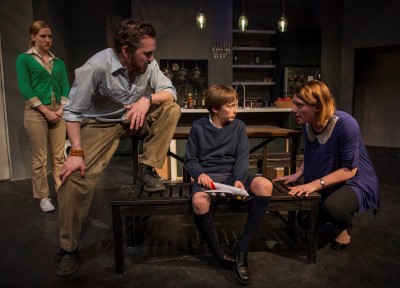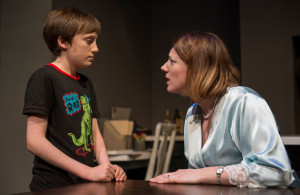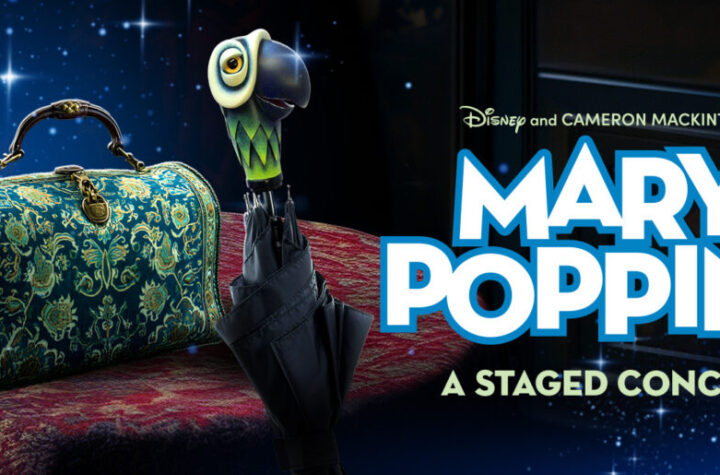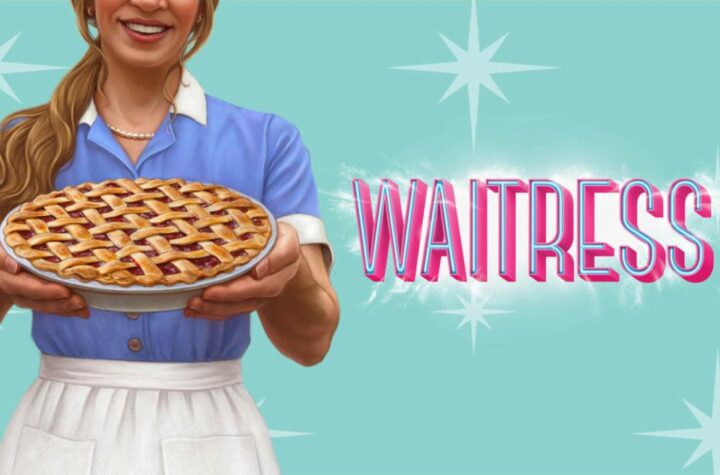
Nancy Harris’ “Our New Girl” is a mysterious play, perhaps a little too mysterious, with a little too much going on, and while “Profiles Theatre” production boasts extremely strong performances by the actors which manage to keep the audience engaged and do ultimately hold the show together, as well tense and affecting blocking, the direction (Joe Jahraus) sometimes falls down at the level of dialogue because it is spoken so quickly that, at times, it could barely be understood through the foreign dialects. Also, the velocity at which the dialogue was being spoken (a problem in the Jahraus’s staging of The Cryptogram” last year) left one wondering if he doesn’t have a rather idiosyncratic aesthetic paradigm for, and definition of, suspense.
It has to be said, however, that Harris’s script isn’t always ripe for material for it, even though suspense does appear to be for what she was going. There simply is too much going on so that the narrative threads, symbols, foils, and interpersonal interaction between the four characters seem destined to become cluttered and remain ill-defined in any production, no matter how fascinating they may be as individual facets of the play. Take the antecedent action as an example. Before the play even begins, Hazel (Sarah Chalcroft) has quit her job as a corporate lawyer in London to be a stay at home Mom to her son, Daniel (Killian Hughes) and run a business selling olive oil. She is succeeding at neither, and has a baby on the way.
Two separate incidents seem to have been a single catalyst to her decision. According to her husband Richard (Layne Manzer), and Hazel all but confirms it, she developed a “girl-crush” on a pregnant woman who ran a small bed and breakfast at their olive farm in Sicily. Hazel said the woman was “pregnant and beatific” with happy children running around her helping, and that the women never once lost her temper with them. As a result, Hazel has quit her job, entered into an ill-advised business contract with the woman who speaks no English to sell olive oil, and decided stay home to raise the new baby and Daniel of whom she is clearly terrified.
The second catalyst is entirely contradictory. It seems she became so engrossed in using her superlative skills as a contractual attorney to resolve a crisis at her firm that in the process she left Daniel in a busy London supermarket. “Anything could have happened…if someone else had found him. I think about every day,” so she decided to quit her job, she confesses to Annie (Miriam Canfield), the family’s nanny, half-way through the play. Then, there is the matter of Hazel making such a confession to Annie (she hasn’t told Richard). It doesn’t make any sense. Forget that both characters’ are women, Hazel mistrusts Annie from the very beginning of the play, despite the fact that she has more than enough documentation and a contract (there it is again) to ultimately persuade both Hazel and the audience that Richard, who has been doing humanitarian relief work in Haiti for six months, has retained Annie to provide Hazel with some relief which she clearly needs. Not that Hazel’s mistrust is ill-founded. Annie repeatedly usurps Hazel’s role as a mother, violates her boundaries (physical, parental, what-have you), and tries to undermine her relationship with Richard: which she manages to do pretty effectively by having an affair with him. All this, despite the fact that one sometimes gets the feeling that Annie has a “girl crush” of her own on Hazel: talking about how brilliant she must have been as an attorney, how brilliant home her home is, and asks Richard, “Do you think I could ever be like that?” (Although Jahraus and Canfield occasionally try to play such lines for irony, it isn’t really sustainable: Annie is some sort of awe). Nevertheless, Hazel’s attitude with Annie is marked by a prescient, quiet terror, almost from the beginning.
Effective blocking contributes greatly to this: as Annie moves across the stage in first scene in which she appears, she insidiously but repeatedly encroaches on Hazel’s physical space—foreshadowing the coming action. This is sustained throughout the performance. There is something quite dark about Annie, despite her cheerful Irish brogue and rustic charisma: she grew up on a farm in Ireland where she saw pet pigs (they were named) slaughtered, and where her mother drowned herself when Annie was ten. She has also been disfigured in a place that doesn’t show when she was brutally beaten by her father “one time only when he was out of his head with grief.” Her mother’s suicide makes her especially unreceptive to Hazel’s confession about forgetting Daniel in a supermarket amongst strangers: she says “It’s you that should be ashamed, now wonder he is the way that he is?” But what way is that?
The provenance of the situational drama, and much of the tension, especially after Richard shows up and confirms that Annie hasn’t committed some impossible fraud, comes from the presence of Daniel: the primary school child who gets in trouble at school for repeatedly staring at a Chinese girl. Hazel believes that he wanted to touch her: why else would the headmistress be involved? There is another possibility though. The girl has a surgical mark on her for head where a birthmark was removed, and Daniel explains that he simply believes his father, who has a day-job as a plastic surgeon, would have done a better job. Hazel talks about “a look,” that Daniel has but Daniel seldom faces the audience. Presumably, Jahraus has blocked it this way so we don’t know if Hazel’s terror of him has some basis, or if Annie is correct, and she is just over-reacting because Hughes acquits himself superlatively when we do see him with a persona and expression marked by perfect ambiguity.
He could be a morose child who delights in the macabre, as many kind people of all ages are, or his interest could point to an underlying threat of violence (some of his behaviors certainly do). As we wait for the affair between Annie and Richard to be relieved, the nature of Daniel’s character to be exposed, and the baby to arrive, there is one exceptionally strange symbol at the heart of the play: Hazel has secretly bought Daniel a pet tarantula: that is poisonous, terrifying, and that she can’t bear to look at, to take care of. Richard has no idea that it’s in the house. When its presence is revealed by Annie, Hazel says that she bought it to teach him responsibility, to see if he could take care of something which was frightening, and that “it, turns out he can. He is so much better at it then I am.” That makes the Tarantula sound like a symbol for Daniel, but we also hear that something “strange,” “from some place foreign,” (that can’t be sent back) and “dangerous,” has been brought into the house without Richard’s permission: that sounds a lot more like a symbol or foil for Annie. With all this going on, combined with dialogue that at times is spoken far too quickly, it’s just too easy for tension to get lost, and the acting has to hold the whole thing together; fortunately, it more than does. Sarah Chalcroft is amazing as Hazel. She captures intelligence, exhaustion, fear, and a yearning for domestic life in which she clearly doesn’t belong in every single gesture and word, and sustains it throughout the play: whether she is yelling, scolding, or crying.
I’ve rarely seen such energy mixed with such a perfectly realistic performance style: she fully inhabits the part to the point where there is no sense that she is even acting. I also think it was quite sophisticated of Harris to write Hazel as having an intense desire to abandon professional life for motherhood despite feeling ill-suited for it rather than putting it down to societal pressure. If only she had written such subtlety into Richard’s character. Nevertheless, Layne Manzer dutifully plays the superficial, good-looking, cosmetic surgeon who becomes famous for the disaster relief work he does to support his own ego while completely neglecting, then betraying, family life. His performance is credible enough, but there isn’t anything in the role for him to sink his teeth into. Miriam Canfield is somewhere between delightful and menacing as the energetic, damaged, rustic Nanny from rural Ireland, and Killian Hughes, from what we did get to see of him, as Daniel, clearly has a bright future.
The show is most menacing technically so that the suspense in the rest of production gets overshadowed to the point where it threatens to be completely quashed. The kitchen set (Tyler Reinert) doesn’t look anything like a London kitchen, and is a bit too menacing filled with properties and dangers that never come to fruition, much like Harris’s play in which the ending seems like the best possible solution to the situation rather than the terror or devastation that has been promised by its beginning, symbols, tone, dialogue, and heightening tension.
“Our New Girl” is playing at Profiles Theatre-Main Stage located at located at 4139 N. Broadway Avenue, Chicago through June 28,th 2015. It plays Fridays through Sundays with performances Fridays at 8:00 pm, Saturday’s at 5:00 pm and 8:00 pm, and Sundays at 7:00 pm. Tickets are between 35 and 40 dollars. They can be purchased by calling 773-549-1815 or by visiting http://www.profilestheatre.org/box_office.html. The show runs two hours an one intermission.
To see what others are saying, visit www.theatreinchicago.com, go to Review Round-up and click at “Our New Girl”







More Stories
“Mary Poppins : A Staged Concert” reviewed by Julia W. Rath
” I and You”
“Johnny Cobweb” reviewed by Mark Reinecke